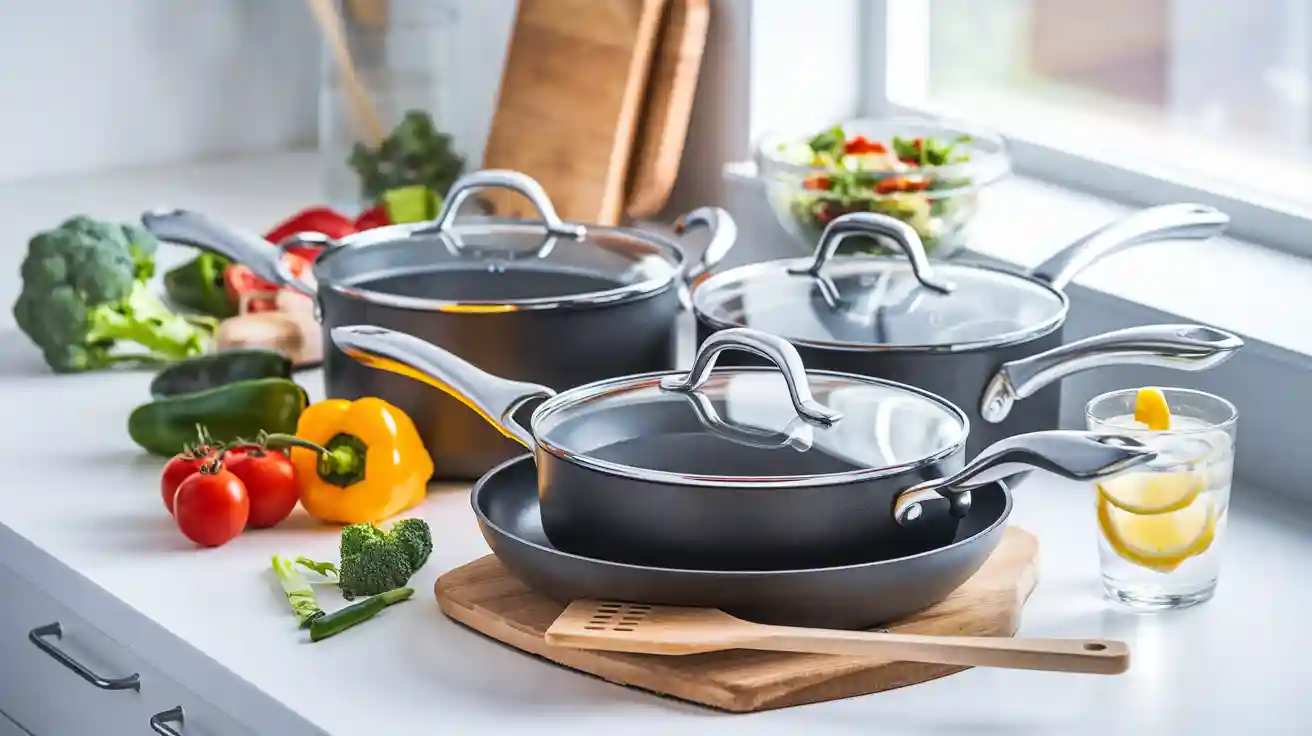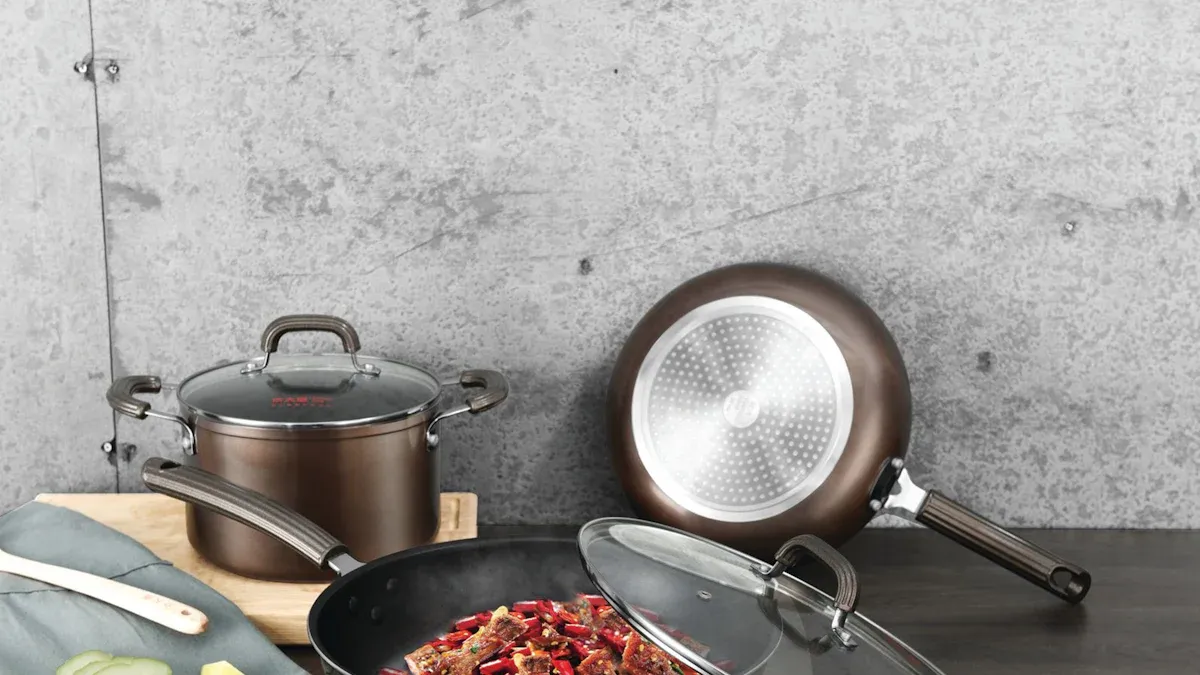
You want a healthier kitchen, so you need safe cookware that does not leach toxic chemicals. Many nonstick pans—about 79%—use PFAS coatings, which experts link to health risks. Choosing the best nonstick cookware set made from non-toxic, safe materials keeps your meals safer. Ceramic, stainless steel, and enamel-coated non-stick pans avoid these hazards. Non-toxic, easy to clean, and durable options help you create safer everyday meals. Studies show that the best non-toxic cookware reduces your exposure to harmful substances. The best nontoxic cookware supports your health and makes cooking easier.
What Makes the Best Non-Toxic Cookware?
Non-Toxic Materials in Non-Stick Pans
When you look for the best non-toxic cookware, you want to choose non-stick pans made from safe materials. Experts recommend avoiding heavy metals and toxic chemicals like PFAS and PTFE. Instead, you should look for non-stick pans made from food-grade materials such as 18/10 stainless steel with an aluminum core, ceramic coatings, or cast iron. These materials do not release harmful substances during cooking. Many brands, like Caraway, use ceramic coatings made from silicon dioxide, which creates a hard, dense non-stick surface. You can also find non-stick pans that are certified by third-party labs, such as SGS or TUV, to meet strict safety standards.
Tip: Always check for certifications like California Prop 65 or EU food safety standards to ensure your safe cookware meets the highest requirements.
- Ceramic-coated non-stick pans
- Stainless steel with aluminum core
- Cast iron and carbon steel
- Porcelain enamel-coated cookware
Avoiding Harmful Chemicals in Non-Stick Cookware
You should avoid non-stick pans that contain PFAS, PTFE, or PFOA. These chemicals, often called “forever chemicals,” can build up in your body and the environment. Health concerns linked to PFAS include cancer, hormone disruption, and immune system problems. Even though modern non-stick cookware is PFOA-free, some products still use other PFAS chemicals. To reduce health concerns, choose non-stick pans that are free from these substances. Stainless steel, cast iron, and ceramic-coated non-stick pans are safer alternatives. Always use non-stick cookware at medium or low heat and avoid scratching the surface to keep it safe.
Health Benefits of the Best Nontoxic Cookware
Switching to the best non-toxic cookware helps you avoid exposure to toxic chemicals. Research shows that aluminum and low-quality stainless steel can leach metals into your food, while PTFE coatings may release fumes if overheated. By choosing healthy cookware like glass, porcelain-enamel, or 100% ceramic non-stick pans, you protect your health. These nontoxic cookware options do not leach harmful substances and are easy to clean. You can enjoy safer meals and peace of mind knowing your non-stick pans support your well-being.
Top Picks: Best Nonstick Cookware Set for Healthier Cooking
Comparison Table of the Best Nonstick Cookware Sets
You want to find the best nonstick cookware set for your kitchen. Many non-toxic cookware brands offer sets that balance safety, performance, and value. The table below compares some of the most popular non-stick options. You can see how each set stands out in price, material, and special features.
| Brand/Set Name | Price Range | Material/Coating | Key Features & Performance | Trade-offs/Notes |
|---|---|---|---|---|
| Caraway Ceramic-Coated Non-Stick | $395 | Ceramic-coated, PFAS-free | Even heating, easy cleaning, modern design, oven safe | Pans stain on outside, solid lids |
| GreenPan Valencia Pro | $400 | Ceramic, PFAS-free | Award-winning durability, metal utensil safe, non-toxic | Frying pans shallow, no lids for fry pans |
| Cuisinart GreenGourmet GG-12 | $200 | Hard-anodized, ceramic | Steamer insert, oil-free cooking, good food release | Handles can get hot, some wear over time |
| Blue Diamond Diamond-Infused Ceramic | Under $100 | Ceramic, PTFE-free | Fast heating, good retention, includes steamer & utensils | Some wear after dishwasher use |
| Le Creuset Toughened Nonstick PRO | $400+ | Nonstick, PFAS-free | Quick, even heating, premium build, excellent performance | Premium price |
Note: Many affordable nonstick sets perform well in cooking tests, but you should check for durability and the number of true cooking pans included.
Key Features and Safety Highlights of Non-Stick Pans
When you choose a best nonstick cookware set, you want to focus on features that support healthy cooking. Most top-rated non-stick pans use ceramic or hard-anodized aluminum with a non-toxic coating. These materials do not contain PFAS or PTFE, so you avoid harmful chemicals. Caraway and GreenPan both use ceramic coatings that resist scratches and allow you to use less oil. Cuisinart GreenGourmet stands out because it includes a steamer insert, which helps you cook vegetables without extra fat. Blue Diamond offers a budget-friendly set with diamond-infused ceramic for better heat retention.
You should also look for non-stick pans that are oven safe and easy to clean. Many nonstick sets recommend hand washing to extend the life of the non-stick surface. Some sets, like Le Creuset, offer premium durability and even heating, which helps you cook food evenly without burning. Handles should feel sturdy and comfortable, so you can move your cooking pans safely.
Tip: Always check if your non-stick pans are PFAS-free and oven safe. This ensures you get the best non-toxic cookware for your family.
Pros and Cons of Each Best Non-Toxic Cookware Set
You want to know the strengths and weaknesses of each best nonstick cookware set before you buy. User reviews highlight what works well and what could be better. Here is a summary of the most common pros and cons for top non-toxic cookware sets:
| Cookware Set | Pros | Cons |
|---|---|---|
| Caraway 12-Piece Nonstick Ceramic Cookware Set | – Modern design, stainless steel handles – Premium feel, good weight – Lids for all pans – Comfortable, heavy-duty handles | – Pans stain easily on the outside – Sticking issues on gas stoves – Solid lids (no visibility) |
| GreenPan Reserve Ceramic Nonstick 10-Piece Set | – Stylish design, color options – Very good nonstick performance – Lightweight, durable | – Shallow frying pans – No lids for frying pans |
| Carote 12-Piece Ceramic Cookware Set | – Glass lids, cool-touch knobs – Excellent nonstick performance – Durable for many foods – Includes utensils | – Handles burn on gas stoves |
| Cuisinart GreenGourmet GG-12 | – Steamer insert for oil-free cooking – Good food release – Even heating | – Handles get hot – Some wear over time |
| Blue Diamond Classic Diamond-Infused | – Fast heating – Good heat retention – Includes steamer and utensils | – Some wear after dishwasher use – Caution with metal utensils |
You can see that the best nonstick cookware set for you depends on your needs. Caraway and GreenPan offer modern designs and strong non-stick performance. Cuisinart GreenGourmet helps you cook with less oil, which supports healthier meals. Blue Diamond gives you value and quick heating, but you may notice some wear if you use the dishwasher. Always consider how you cook and what features matter most to you.
Remember: Non-toxic cookware helps you avoid harmful chemicals and supports your health. Choose non-stick pans that match your cooking style and care for them properly to enjoy long-lasting performance.
Safe Materials Used in the Best Nonstick Cookware Set

Ceramic-Coated Non-Stick Pans
Ceramic-coated non-stick pans use safe materials that protect your health. Manufacturers create these nonstick pans with a silica-based coating made mostly from sand and water. This process avoids PFAS and PTFE chemicals. You do not have to worry about harmful fumes, even if you accidentally overheat the pan. Toxicologists agree that ceramic coatings are nontoxic and safe for you and the environment. You should avoid using high heat or metal utensils to keep the non-stick surface working well. When you care for these nonstick pans, you get a reliable and safe cookware option for daily use.
Stainless Steel Non-Stick Options
Stainless steel nonstick pans give you a durable and chemical-free choice. These non-stick pans do not have any coatings that can break down or release toxins. You can brown food well and enjoy a natural cooking surface. Stainless steel is one of the safest options for nonstick cooking pans. You may need to use a little more oil, but you avoid the health risks linked to chemical coatings. Cleaning takes more effort, but you get peace of mind knowing your safe cookware will not leach harmful substances.
- Stainless steel nonstick pans are uncoated and reduce chemical exposure.
- You can use them for many recipes and enjoy long-lasting performance.
Enamel-Coated Non-Stick Cookware
Enamel-coated nonstick pans combine the strength of cast iron with a smooth, nonreactive surface. The porcelain enamel layer keeps the pan from rusting and stops acids from reacting with the metal. You get excellent heat retention and even cooking. These non-stick pans do not need seasoning, so you save time on maintenance. You should preheat and use a bit of oil to prevent sticking. Enamel-coated nonstick pans cost more, but they are easy to clean and last for years.
- The enamel coating makes these nonstick pans rust-resistant and safe for acidic foods.
- You do not have to worry about chemical exposure from the cooking surface.
Cast Iron and Carbon Steel Non-Stick Pans
Cast iron and carbon steel nonstick pans use no chemical coatings. You create a natural non-stick surface by seasoning the pan with oil. This layer gets better with each use. Cast iron holds heat well and cooks food evenly, but it feels heavy. Carbon steel heats up quickly and is lighter, making it popular with chefs. Both types of nonstick pans last a lifetime if you care for them. You avoid harmful chemicals and enjoy safe cookware that supports healthy cooking.
Tip: Choosing nonstick pans made from safe materials like ceramic, stainless steel, enamel, cast iron, or carbon steel helps you protect your health and the environment. 🌱
How to Choose the Best Nonstick Cookware Set
Assessing Your Cooking Habits for Non-Stick Pans
You should start by thinking about your daily cooking habits. If you often make eggs, pancakes, or fish, nonstick pans help you cook these foods with less oil and easy cleanup. Non-stick cookware works best for quick meals and delicate foods. If you like to sear meat or cook at high heat, cast iron or carbon steel pans may suit you better. Aluminum nonstick pans feel light and heat up fast, which is great for busy kitchens. Ceramic non-stick pans offer a chemical-free surface but may not last as long if you use them every day. Your cooking style, the foods you prepare, and how much time you spend cleaning all affect your choice of non-toxic cookware.
Setting a Budget for the Best Nontoxic Cookware
You can find nonstick cookware at many price points. High-quality non-toxic sets cost more but last longer and protect your health. If you want the best nonstick cookware set, look for pans with multiple layers of non-stick coating. These resist scratches and peeling. Cheaper nonstick pans may wear out quickly and lose their non-stick surface. Think about how often you cook and how much you want to invest in safe, non-toxic cookware. Sometimes, spending a bit more on the best nontoxic cookware saves money over time because you replace pans less often.
Prioritizing Health and Safety Features in Non-Stick Cookware
When you choose nonstick cookware, always check for safety. Pick pans free from harmful chemicals like PFOA, PTFE, lead, and cadmium. Look for labels or certifications that show the cookware is non-toxic. Choose non-stick pans that work with your stove, whether it is gas, electric, or induction. Handles should feel comfortable and stay cool. Use wooden or silicone utensils to protect the non-stick coating. Avoid high heat to keep your non-toxic pans safe. Easy-to-clean and dishwasher-safe options help you keep your kitchen healthy.
Tip: Always follow the manufacturer’s instructions for your nonstick pans. This helps you keep your non-toxic cookware safe and long-lasting.
Care and Maintenance Tips for Non-Stick Cookware
Cleaning Best Practices for Non-Stick Pans
You want your nonstick pans to stay easy to clean and last longer. Always let your non-stick pan cool before washing. This step prevents warping. Use a soft sponge or cloth with mild dish soap and warm water. Avoid abrasive scrubbers or steel wool, which can scratch the nonstick coating. Hand washing works best, as dishwashers use harsh detergents and high heat that can damage the surface. Never soak your nonstick pans overnight, since acidic residues can harm the coating. For tough stains, gently boil water with a little baking soda and vinegar in the pan. Dry your non-stick cookware completely to prevent water spots or rust on exposed metal.
Tip: Use wooden, silicone, or plastic utensils to keep your nonstick pans in top shape.
Extending the Life of Your Best Nonstick Cookware Set
You can make your nonstick cookware last longer by following a few simple steps:
- Cook on low to medium heat. High heat can damage the non-stick surface and release fumes.
- Avoid preheating empty pans. This can cause the coating to break down quickly.
- Use oils with high smoke points, like canola or avocado, to prevent sticky residue.
- Season your nonstick pans by rubbing a thin layer of oil and heating them on low, then wiping off the excess.
- Store your nonstick pans with paper towels or pan protectors between them to avoid scratches.
- Regularly check your pans for scratches, chips, or peeling. Replace any damaged pans to keep your kitchen filled with safe cookware.
Safety Precautions for Non-Stick Cookware
You should always use nonstick cookware safely. Never overheat your non-stick pans, especially above 500°F, as this can release harmful fumes. Do not leave nonstick pans empty on a hot burner. Good kitchen ventilation helps clear any fumes if they occur. Always use non-metal utensils to avoid scratching the coating. If you see peeling or deep scratches, replace the pan right away.
Note: Safe cookware keeps your meals healthy and your kitchen worry-free. Handle your nonstick pans with care to enjoy their benefits for years.
You protect your health when you choose nonstick cookware made from safe materials.
- Pick pans free from harmful chemicals for safer meals.
- Care for your nonstick pans by using gentle cleaning and proper storage.
Healthy cookware and good habits help you cook with confidence and enjoy peace of mind.
FAQ
What is the safest nonstick cookware material?
You should choose ceramic, stainless steel, or enamel-coated cookware. These materials do not release harmful chemicals.
Tip: Always check for PFAS-free labels when you shop.
Can you use metal utensils on nonstick pans?
You should avoid metal utensils. They can scratch and damage the nonstick coating.
- Use wooden, silicone, or plastic utensils for best results.
How do you know when to replace nonstick cookware?
You should replace your pan if you see peeling, deep scratches, or discoloration.
Damaged coatings can affect your food and health.


